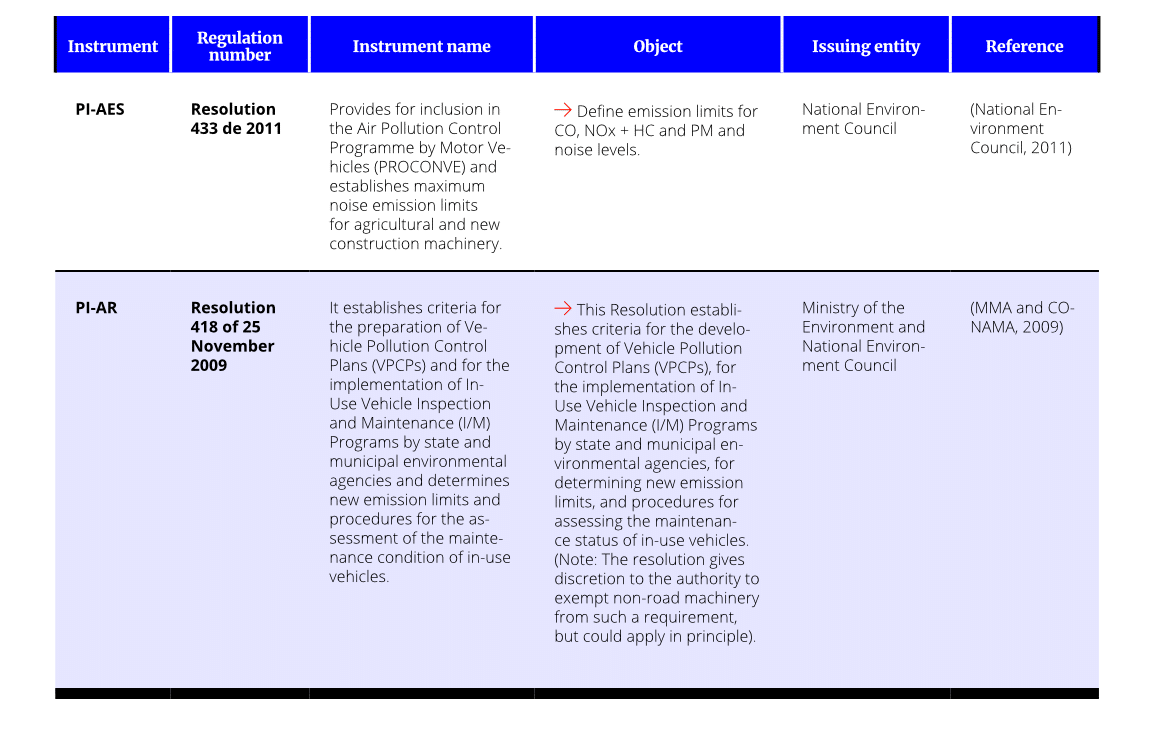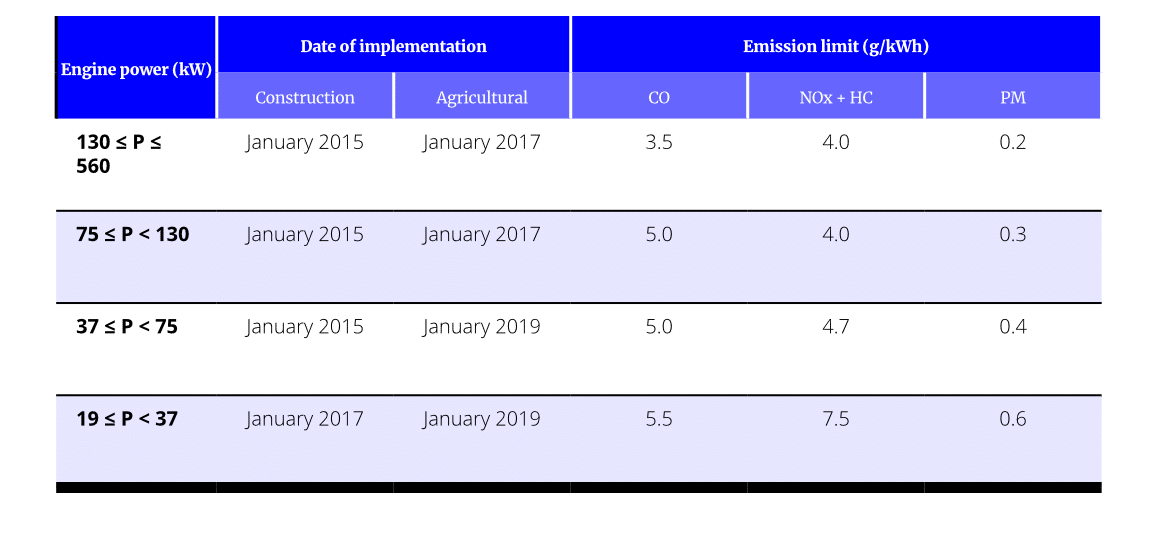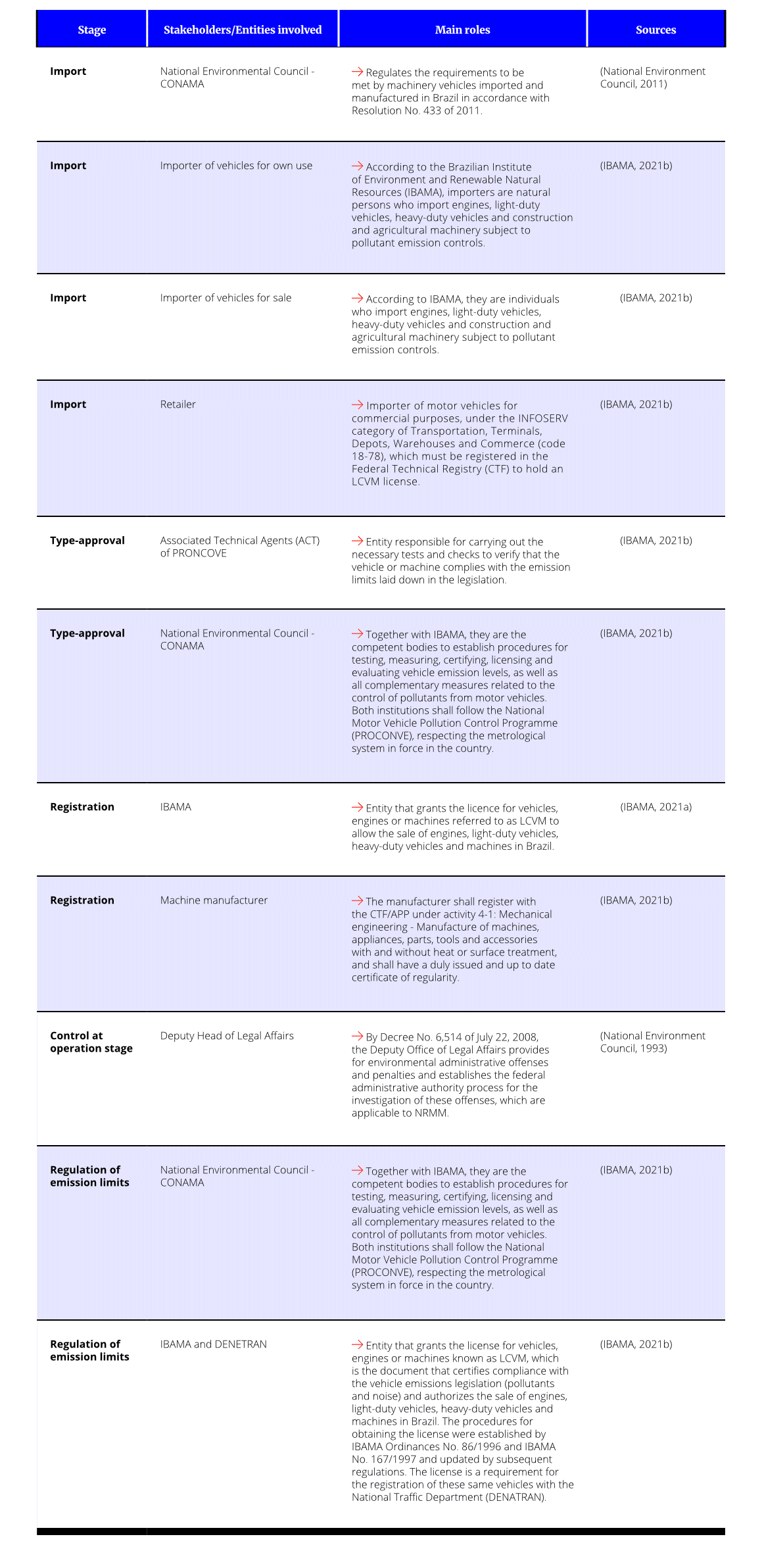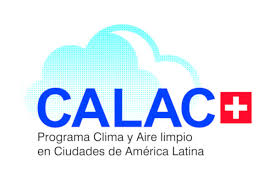BRASIL (en)

/1/
Definitions of
non-road mobile
machinery
In Brazil, Resolution 433 (2011) of the National Environmental Council was the first to establish emission and noise limits for agricultural and construction machinery. This regulation establishes emission limits equivalent to Tier 3 technologies in the United States and Stage III in the European Union (DieselNet, 2019). Generally, Brazilian regulations classify its off-road machinery as agricultural and construction machinery which are defined as follows:
- Agricultural machine: self-propelled machine with wheels or tracks, which has equipment or attachments designed primarily for soil preparation, sowing, cultural treatments, harvesting of agricultural and forestry products.
- Construction machine: self-propelled machine with wheels, tracks or legs, which has equipment or attachments designed primarily for trenching, digging, loading, carrying, transporting, spreading or compacting earth and similar materials.
Note: It is important to note that no explicit definition was identified for non-road mobile machinery but for machinery in certain categories.

/2/
Main regulatory
instruments for NRMM
emissions reduction
Table 1 presents a compilation of different types of instruments identified in Brazil for the control of air pollution generated by NRMM.
TablE 1
Regulatory framework and identification of NRMM emission reduction tools


/3/
Emission standards
for air pollutants
For construction and agricultural machinery in Brazil, the PROCONVE MAR-1 regulation sets the emission standards with which they must comply to operate in the national territory. The regulation established emission limits equivalent to North American Tier 3 and European Stage IIIA standards. The following table specifies them for each type according to their engine power.
TABLE 2
Maximum emission limits for agricultural and construction machinery engines.

Resolution 433 of 2011 (National Environment Council, 2011) also states generally that:
- Emissions of carbon monoxide (CO), hydrocarbons (HC), nitrogen oxides (NOx) and particulate matter (PM) must comply with ISO 8178-1.
- The sound power level shall be measured under the conditions established in accordance with NBR-NM-ISO 6395, and shall not exceed the permissible level Lwa in dB (A) / 1 pW specified in the Annex to Resolution 433 of 2011 in relation to the net installed power in kW.
- The net installed power shall be determined as defined in ISO 14396: 2002.
- The reference fuel for the type-approval test shall be, for MAR-I Stage, regulated by the National Agency for Oil, Gas and Biofuels (ANP).

/4/
Import requirements
and type-approval
processes
According to Resolution No. 433 of the National Environmental Council (2011), Articles 3 to 8 establish the requirements for the importation of agricultural and construction machinery, which are:
- Establishment of maximum pollutant emission limits for diesel cycle engines, provided for in Table I of Annex A of this Resolution for agricultural and new construction machinery, of national and imported origin, defined through the Mercosur Common Nomenclature (NCM) codes according to Annex B of this Resolution.
- Engines with power equal to or greater than 19 kW for domestic and imported agricultural and construction machinery, sold in Brazil, must comply with the maximum emission limits defined in Table I of Annex A of this resolution and the dates established in Article 4.
- According to article 7 of the Resolution, only models of agricultural and construction machinery, national or imported, that have the LCVM – Licença para Uso da Configuração de Veículo ou Motor, issued by IBAMA, may be sold.
- Road machinery shall comply with the maximum permissible noise limits set out in Annex A of the resolution.
On the other hand, the Licença para Uso da Configuração de Veículo ou Motor (LCVM) is a mandatory document that certifies compliance with vehicle emissions legislation (pollutants and noise) and allows the sale of engines, light vehicles, heavy vehicles and machines in Brazil (2021). To qualify for this licence, it is necessary to:
- Apply for the LCVM on IBAMA’s website through the PROCONVE / Promot Computerised System (INFOSERV) according to the following steps:
- Access the Services Login with CPF / CNPJ and password, or Digital Certificate. Access the INFOSERV system.
- Apply for the licence in the system, according to the modalities: limited quantities or unlimited quantities.
- Complete the information requested, according to the type of licence required, and submit the request. INFOSERV can also follow the progress of the analysis of the request.
- When the licence is granted, the system will generate the Payment Guide in PDF: fee of R$721.77 for issuing a statement of conformity with noise limits and R$721.77 for issuing the LCVM by application (as per Interministerial Order No. 812/2015).
- After payment, the user must click on “Progress of open requests” and click on the “Details” icon to generate the licence PDF.
IBAMA may exempt the importer or manufacturer from the obligation to obtain the LCVM, in the following cases, in accordance with IBAMA Ordinance 86/1996 and CONAMA Resolution No. 15/1995:
- Prototypes for emissions tests and adaptation tests.
- For economic feasibility tests.
- Adapted for use by disabled people.
- Donation to philanthropic entities.
- For diplomatic use.
- Older collecting vehicles (over 30 years old).
- For special applications (not suitable for urban and/or road transport).

/5/
Labelling
processes

/6/
Regulation on machinery
useful life, repowering, overhaul and
scrapping practices
Regarding final disposal, Brazil enacted Resolution 530 that regulates Law No. 12.977 aimed at defining the guidelines for the scrapping of land motor vehicles (National Traffic Council of Brazil, 2015; Presidency of the Republic of Brazil, 2014). The Brazilian Institute of the Environment and Renewable Natural Resources (IBAMA) is the entity that grants the license for vehicles, engines or machines called LCVM, which is the document that certifies compliance with the legislation on vehicle emissions (pollutants and noise). The Resolution defines the main stakeholders in the inspection processes of the sites where motor vehicles are scrapped. The main objective of Law 12.977 is to combat the clandestine trade of spare parts (Silva, 2016), as well as to define the guidelines and specifications regarding the scrapping of vehicles. The waste generated during the scrapping of vehicles must comply with the requirements defined in the National Solid Waste Policy established in Law No. 12.305 of August 2, 2010.
It should be noted that it is not specified whether this general rule also covers NRMM.

/7/
Operational and road
circulation requirements

/8/
Procedures for NRMM
control and inspection
in the operation stage

/9/
Actors in import processes, manufacturing, registration, marketing, control and final practices of useful life of the MMNC
The following table presents the main stakeholders identified in Brazil’s NRMM processes. Following the table, some complementary aspects are presented.
TablE 3
Stakeholders and roles – Brasil

Fuente: elaboración propia.
[…] the associated technical agents (ATC) are those who carry out the necessary tests and verifications to verify that the vehicle or machine complies with the limits provided for in the legislation.
Import
National Environmental Council: regulates the requirements to be met by machinery vehicles imported and manufactured in Brazil in accordance with Resolution No. 433 of 2011 (National Environmental Council, 2011).
Importer of vehicles for own use: according to the Brazilian Institute of Environment and Renewable Natural Resources (IBAMA), importers are natural persons who import engines, light-duty vehicles, heavy-duty vehicles and construction and agricultural machinery subject to pollutant emission controls. After issuing the first authorisation, the company must register with the CTF/APP under activity 21-43: Activities subject to environmental control and inspection not listed in Annex VIII of Law No. 6.938 / 1981: Importation of motor vehicles for own use and Law No. 8723/1993. From the second authorization, upon request, the company must already be registered in the CTF / APP with the Certificate of Validity Standing in good standing (IBAMA, 2021b).
Importer of vehicles for sale: according to IBAMA, they are individuals who import engines, light-duty vehicles, heavy-duty vehicles and construction and agricultural machinery subject to pollutant emission controls. After issuing the first authorisation, the company must register with the CTF / APP in activity 21-44: Activities subject to environmental control and inspection not listed in Annex VIII of Law No. 6.938 / 1981: Importation of motor vehicles for sale and Law No. 8723/1993. From the second authorisation, upon request, the company must already be registered in the CTF / APP with the Certificate of Validity in good standing. (IBAMA, 2021b).
Manufacturing
Machine manufacturer: according to IBAMA, individuals who produce engines, light-duty vehicles, heavy-duty vehicles and construction and agricultural machinery subject to pollutant emission controls. The manufacturer must register in the CTF/APP in activity 4-1: Mechanical industry – Manufacture of machines, equipment, parts, tools and accessories with and without heat or surface treatment, in addition to having the regularity certificate duly issued and up to date (IBAMA, 2021b).
Associated Technical Agents of PROCONVE (ACT): the associated technical agents (ATC) are those who carry out the tests and verifications necessary to validate that the vehicle or machine complies with the limits set out in the legislation. The ATCs charge for the service provided directly by the user and correspond to the following entities: the vehicle type-approval sector of the Environmental Company of the State of Sao Paulo (CESETB) and the Technological Institute of Mauá (IMT) (IBAMA, 2021b).
Registration
IBAMA and DENATRAN: The Brazilian Institute of Environment and Renewable Natural Resources (IBAMA) is the entity that grants the license for vehicles, engines or machines known as LCVM, which is the document that certifies compliance with the vehicle emissions legislation (pollutants and noise) and authorizes the sale of engines, light-duty vehicles, heavy-duty vehicles and machines in Brazil. The procedures for obtaining the license were established by IBAMA Ordinances No. 86/1996 and IBAMA No. 167/1997 and updated by subsequent regulations. The license is a requirement for the registration of these same vehicles with the National Traffic Department (DENATRAN) (IBAMA, 2021b).
National Environmental Council – CONAMA: Together with IBAMA, they are the competent bodies to establish procedures for testing, measuring, certifying, licensing and evaluating vehicle emission levels, as well as all complementary measures related to the control of pollutants from motor vehicles. Both institutions shall follow the National Motor Vehicle Pollution Control Programme (PROCONVE), respecting the metrological system in force in the country.
Sale
IBAMA: Entity that grants the license for vehicles, engines or machines referred to as LCVM to allow the sale of engines, light-duty vehicles, heavy-duty vehicles and machines in Brazil (IBAMA, 2021b).
Retailer: Importer of motor vehicles for commercial purposes, under the INFOSERV category of Transportation, Terminals, Depots, Warehouses and Commerce (code 18-78), which must be registered in the Federal Technical Registry (CTF) to hold an LCVM license (IBAMA, 2021a).
Control and inspection
Deputy Head of Legal Affairs: by Decree No. 6,514 of July 22, 2008, the Deputy Office of Legal Affairs provides for environmental administrative offenses and penalties and establishes the federal administrative authority process for the investigation of these offenses, which are applicable to NRMM. According to Article 4 of Law No. 8,723 of October 28, 1993, imported vehicles must comply with the same emission limits and other requirements established for all their sales in the domestic market (National Environmental Council, 1993).
Associated Technical Agents of PROCONVE: entity responsible for carrying out the necessary tests and checks to verify that the vehicle or machine complies with the emission limits laid down in the legislation. The ATCs charge for the service provided directly by the user and correspond to the entities of the vehicle type-approval sector of the Environmental Company of the State of Sao Paulo (CESETB) and the Technological Institute of Mauá (IMT) (IBAMA, 2021b).
Consultation documents (downloadable)
